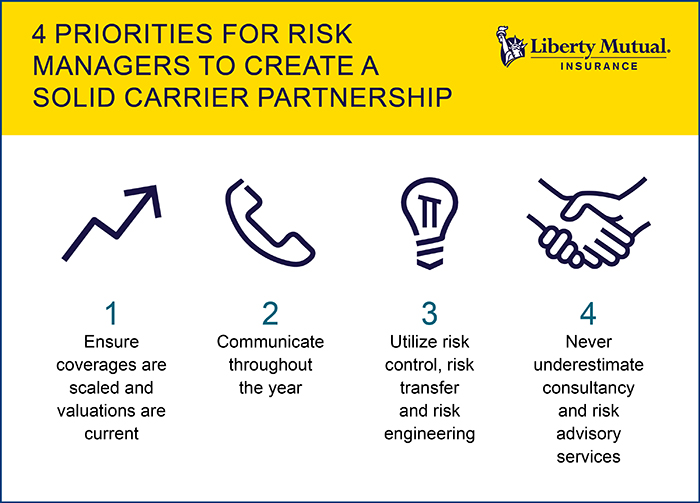Sponsored: Liberty Mutual Insurance
What Will It Take for Companies to Withstand Today’s Growing Economic Volatility? Leaning Into Strong Partnerships with Insurers Is Key

Each day brings news of heightened geopolitical tensions, record-level inflation and extreme climate events that make it more challenging than ever for businesses to envision, let alone plan, for the future.
The simultaneous convergence of multiple economic stressors is testing the resiliency of businesses of every size: “We have never had inflation, recession, pandemic, supply chain issues, social inflation and labor shortage all at the same time,” Matthew Moore, executive vice president and president of underwriting for Liberty Mutual Global Risk Solutions, said, reflecting on his career in insurance.
As companies brace themselves for what U.S. Federal Reserve Chairman Jerome Powell described as “some pain” that will surely come with the Fed’s efforts to curb rising inflation, insurance can play a leading role in softening the blow. Whether that means using insurance to free up capital for other uses, minimizing liabilities, or just supporting the basic function of providing the stability companies need to operate amidst uncertainty.
Just how much companies will have to alter their operations to weather the storms ahead is difficult to forecast. But as the risk environment continues to shift, meeting those challenges will require close collaboration and careful planning.
“It has never been more important for brokers, buyers and carriers to work together to develop smart solutions that strategically manage and mitigate risk,” Moore said. “Insurance can offer solutions.”
Carriers Too May Experience Change

Matthew Moore, Executive Vice President and President of Underwriting for Liberty Mutual Global Risk Solutions
With the Federal Reserve announcing that it would raise interest rates by 75 basis points to a target range for the Federal Funds Rate of 3.0%-3.25% during its September 2022 meeting, experts anticipate a slowdown of the U.S. economy. These changes will alter the risk profile of many organizations, including insurance carriers.
For starters, Moore said, insurance carriers may see less demand for insurance as the economy slows down, which will likely decrease premiums.
“Commercial insurance lines face a potentially greater impact, as exposure bases like payroll or sales can decline quickly, reducing premium and increasing the risk,” Moore added. And while investment income for carriers may increase, their risk tolerance within their portfolios may decline.
For example, carriers may reduce capacity in certain lines and industries based on their vulnerabilities to market cycles. They can also be expected to want to understand any operational changes in greater detail, Moore said.
Rising Risk Profiles of Insureds
“It’s important to understand that when companies make changes, there are impacts to risks. We work with customers and brokers to help understand and navigate that,” Moore said.
With potentially less capital flowing toward risk mitigation, loss controls, workforce safety, good governance, and compliance in a stressed environment, companies can expect carriers to scrutinize their programs.
Economic factors can also complicate other aspects of insurance, namely property valuations. “Our North American property experts estimate that 75% of commercial insureds are undervalued,” Moore explained.
“Inflation, labor shortage and supply chain issues all are driving property replacement costs that are out of sync with valuations. That’s an unpleasant surprise for any company after experiencing a loss,” he added. “A lot of these issues are affecting the businesses themselves, too, further elevating the overall risk profile.”
For that reason, it’s important to maintain trust and communication so companies are not caught off guard and can work through challenges together.
“When recession hits and you have even less money to spend and you know the risk environment has intensified, you need a strong relationship between the carrier, broker, and risk manager to make sure insurance is giving real value.
“Some customers see insurance as transactional and miss value there. There’s a lot that a carrier can offer to lower a company’s total cost of risk by thinking holistically beyond the coverages. These tactics take on even greater importance during times of uncertainty and recession,” Moore added.

Leverage Everything Insurance Has to Offer
This is where tapping into risk advisory services can be especially beneficial to companies facing uncertain market conditions. “Insurance isn’t just a once-a-year engagement at renewal, paid premium, [and] collect claims at some point in time,” Moore said.
“It’s also the duty of an insurer to form a genuine partnership with a customer to improve the risk environment. For insurers to deliver real value to the customer when they most need it, the service, coverage, cost, terms, and conditions must be tailored to a new reality.”
Risk control can be a powerful tool to empower risk managers, especially when their budgets come under pressure. Prevention is worth twice the cure. Partnering with a sophisticated team to identify the biggest loss drivers to inform mitigation tactics can pay dividends.
When it comes to implementing these strategies, carriers can also be invaluable in providing benchmarking data and learnings from similar businesses.
“You’ll see a lot of variation in what kinds of perspective carriers can offer based on their industry expertise. But oftentimes, the value of data and modeling services can go beyond the realms of one industry.
“It’s good for companies to know how they compare against their peers in their industry, but also how they compare against other well-run companies,” Moore said.
Not All Partnerships Are Equal
As a mutual with over a hundred years of experience protecting companies across industries and organizations of varying sizes, Liberty Mutual itself models the resilience companies will be called on to demonstrate to endure market cycles of this kind.
“We’ve seen this before, we’ve been through many recessions and other disruptive events throughout our history,” Moore said.
“Because we’ve been around for a long time, it means our partnerships aren’t so transactional. What do customers want? Access to the same team; that longevity and consistency is valuable.”
As a mutual, Liberty Mutual is not subject to the equity markets in the way others may be with a focus on quarterly profits, Moore added. Having access to a broad product suite and supportive risk engineering capabilities certainly doesn’t hurt either.
“There’s a lot to be said for breadth, scale and stability. We’re talking about over a century of expertise in controlling risks, a global footprint, and long-tenured teams,” Moore said.
“But above all, and this gets to the importance of relationships in this industry and these market cycles, our customers know that we’re on this journey with them. We’re all adapting to new risk realities, together. And when you have trust and open communication, those tough conversations that may come up when the chips are down go a lot smoother.”
Creating a Gameplan for Uncertainty
Supply chain strains, labor challenges, climate disruptions and social inflation aren’t going away anytime soon. Add to that the increased focus on environmental, social and governance (ESG) commitments over the coming years.
Savvy risk managers will look to the power of their partnerships with carriers and brokers to help them roll with the punches. As risk management teams collaborate with their partners toward crafting bespoke solutions that address fluctuations in the environment, four key priorities must remain at the forefront:
- Given rapidly rising inflation, ensure coverages have been scaled and valuations remain current.
- Consider general risk management tactics that include risk control, transfer, and engineering.
- Use risk advisory and consultancy services provided by carriers to understand and implement best practices. This can help improve safety and lower costs.
- Maintain close communication with brokers and carriers throughout the year to avoid surprises at renewal.
“I think this is a time when the power of insurance will really come to bear for individual companies and the global economy,” said Moore. “Recession may be the next test for risk managers. But it’s far from the only challenge on the horizon.”
To learn more, visit: https://business.libertymutual.com/
This article was produced by the R&I Brand Studio, a unit of the advertising department of Risk & Insurance, in collaboration with Liberty Mutual Insurance. The editorial staff of Risk & Insurance had no role in its preparation.










